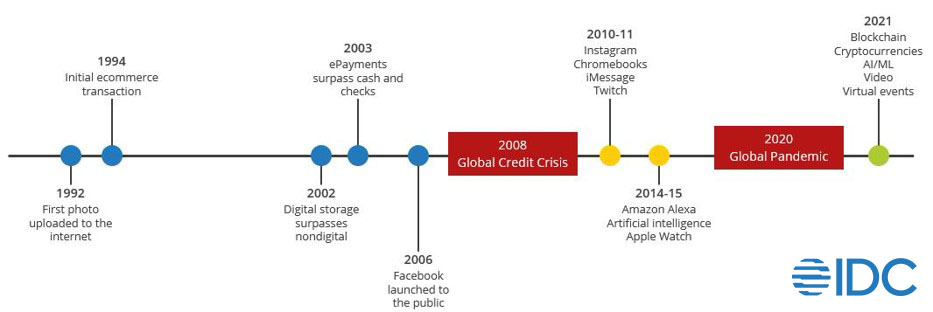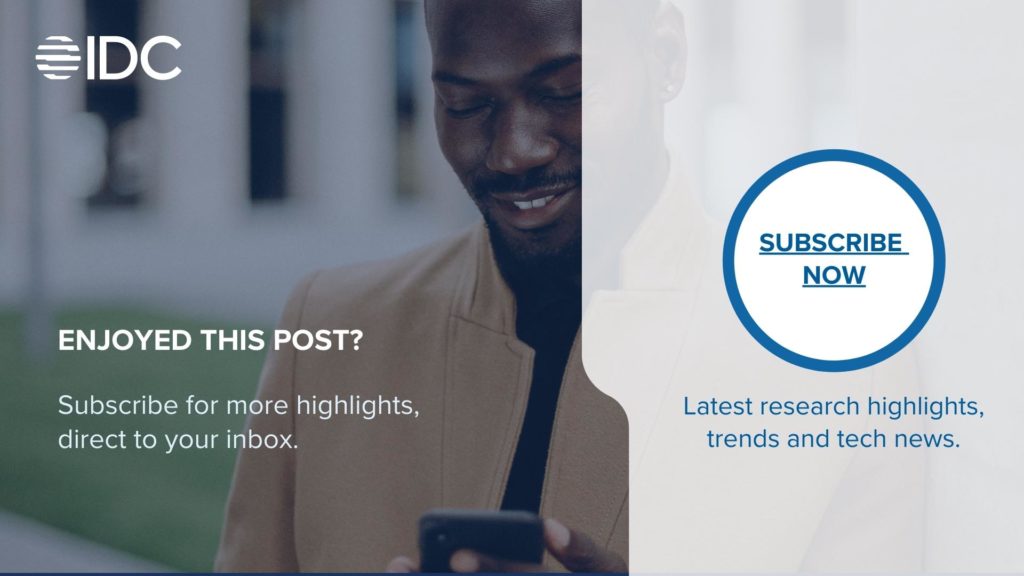B2B marketers have been striving to become “modern marketers” for some time. At it’s core, however, modernization is continuously occurring. It doesn’t have an end. It isn’t a checkbox. Today’s marketing mindset embraces continual change as the new normal.
We are at an important inflection point in B2B marketing. The new playbook is predominately digital, customer centric, and data science driven. But, there are technical challenges posed by disconnected data and lack of marketing’s technical expertise in everything from sophisticated marketing automation to emerging technologies, such as artificial intelligence (AI). To create the ultimate marketing machine, a paradigm shift needs to occur.
Download: How the Shift in Buyer Behavior will Impact B2B Marketing
55% of marketing organizations are not ready yet for the future of marketing.
IDC’s 2021 Future of Marketing Barometer Survey
Marketing’s role is changing. Historically, marketing supported business strategy handed down from the C-suite, most commonly pursuing brand goals. Moving forward, high-performing marketing leaders will align their organizations’ activities to overall business strategy, and they will have a seat at the table to create it. Out of the marketing leaders surveyed, 88% stated the primary future responsibility of marketing is driving business growth. While marketing will still have accountability for generating demand, brand value, and pipeline health, the strategic focus on business growth is the most critical role that marketing will hold moving forward. How does marketing step up to the task?
A New Mindset
When the global credit crisis hit in 2008, the chaos spurred innovation in digital consumer experiences (see Figure 3). Since then, marketing’s digital program investment has gradually been increasing. The global pandemic spurred an even greater acceleration of digital transformation, and as of 2020, digital program investment has surpassed non-digital program spend. Buying behavior has also changed. Today, leading marketers are rethinking traditional digital marketing teams, instead choosing to form teams focused on audience-based experiences, of which digital is a part of.
74% of buyers are comfortable purchasing through ecommerce versus engaging with a human salesperson.
IDC’s 2020 Tech Buyer Survey
Download: Pitfalls to Avoid in Your Next Digital Marketing Campaign
When the experience economy started to take off in 2008, marketers used a “digital first” mantra to ensure that digital aspects were considered in the marketing mix. Today, digitalization of engagement and experiences is no longer an option, nor a small percentage of marketing programming. According to IDC’s 2020 Tech Marketing Benchmark Survey, 65% of advertising and 57% of content marketing is digital. Marketing leaders are shifting their organizations’ paradigm into a new mantra for marketers — “digital always, digital everywhere.” Digital marketing is now what marketing just is.

The shift from brand first to customer first requires a cultural shift. To be truly customer centric is to design marketing’s strategy and actions around the customer’s interests and needs. The mindset goes from an internal focus of establishing brand awareness or generating new leads to an external focus of correlating brand value creation with customer value creation.
IDC defines customer experience as a “customer’s perception and emotional response to the sum of the interactions and engagement with an enterprise.” In IDC’s 2020 Tech Buyer Survey, customer experience was the number 1 factor impacting buyers’ future purchasing. This is a glaring disconnect between what buyers expect and marketing’s accountability. A product marketing focus will not achieve marketing’s objectives moving forward. In fact, IDC’s 2020 Tech Buyer Survey found that 90% of tech buyers are willing to switch vendors if they are dissatisfied with marketing and sales.
The Funnel Is a Mirage — New Organizational Approach for Today’s Marketer
Buyers do not go through their buying journey in a linear fashion. In the era of digitalization, the funnel is merely a mirage. B2B marketing recognizes that the number of buyers continues to grow, currently at 14 different people in a buying cohort (source: IDC’s 2020 Tech Buyer Survey). Marketing’s role is extending beyond traditional boundaries, with marketing gradually increasing investment in post-sales programming to 18%. Buyers in IDC’s 2020 Tech Buyer Survey overwhelmingly identified marketing-led information sources as the top information source across the full buying journey.
B2B marketing in today’s constantly changing world requires a new framework to not only survive but thrive.
Laurie Buczek, Vice President, CMO Advisory Practice, IDC
It is now critical that marketers fully embrace their role as the orchestrator, working across organizational boundaries and supporting the buyers as they bounce around. To facilitate the orchestrator role, organizational silos must come down. Collaborating within the marketing organization has been challenging enough, let alone working outside of marketing teams. New departments created will focus on emerging capabilities such as digital, data, and new marketing technology (e.g., artificial intelligence, machine learning, sophisticated marketing automation).
Future marketing organizations will introduce science to art, with 87.5% of marketing leaders surveyed in IDC’s 2021 Future of Marketing Barometer Survey building at least a quarter of their organization with experts skilled at producing digital engagement and experiences. 72.5% plan to have 25% or more of their organization well versed in how to use data and enable marketing automation. Establishing a data operations team is imperative to properly address closing the looming challenges with disconnected customer data, however, data science skill sets are the most critical gap in marketing organizations today. Marketing leaders are also struggling to find marketing technologists, especially those skilled at sophisticated marketing automation and emerging technologies, along with content, digital, and audience marketing strategy.
Growth Marketing for The Win
For more than a decade, B2B marketing has been managing the funnel with product-led strategies. Marketers are now orchestrating whole journey marketing tactics to digitally serve the buyer, no matter where they are in the journey. As B2B buyers have grown more empowered and their desired experience mirrors consumers, they expect a mentor-marketing approach from brands. Buyers are looking for personalized storytelling about solutions that meet their objectives. Buyers want to easily digest and quickly consume information with less reliance on a human salesperson. Enter the importance of growth marketing, to focus on relationships and building loyalty with buyers. Marketing strategy is shifting toward emotive tactics and content marketing that grabs buyers’ attention in an attention-deficit economy. New digital formats are being tested and embraced to personalize the customer engagement and capture a rich set of customer behavioral and intent analytics.
On The Topic of Growth Marketing and Content Marketing Services
You may also find these links helpful:
B2B Marketing’s Paradigm Shift: A Framework for the Ultimate Marketing Machine:
An in-depth analysis on the evolution of content marketing; where it started, where it’s going and what Marketing’s new role will be.
IDC’s content marketing services:
How we help you create quality, engaging content that is research-driven, personalized and beneficial to your buyers.
Latest B2B Marketing research insights:
Research that focuses on the transforming marketing function and helping companies achieve their business goals through better connection with today’s customer.






